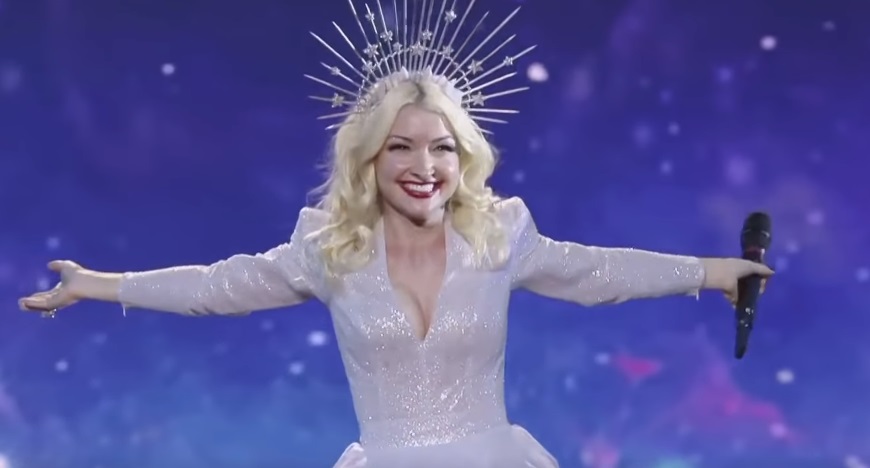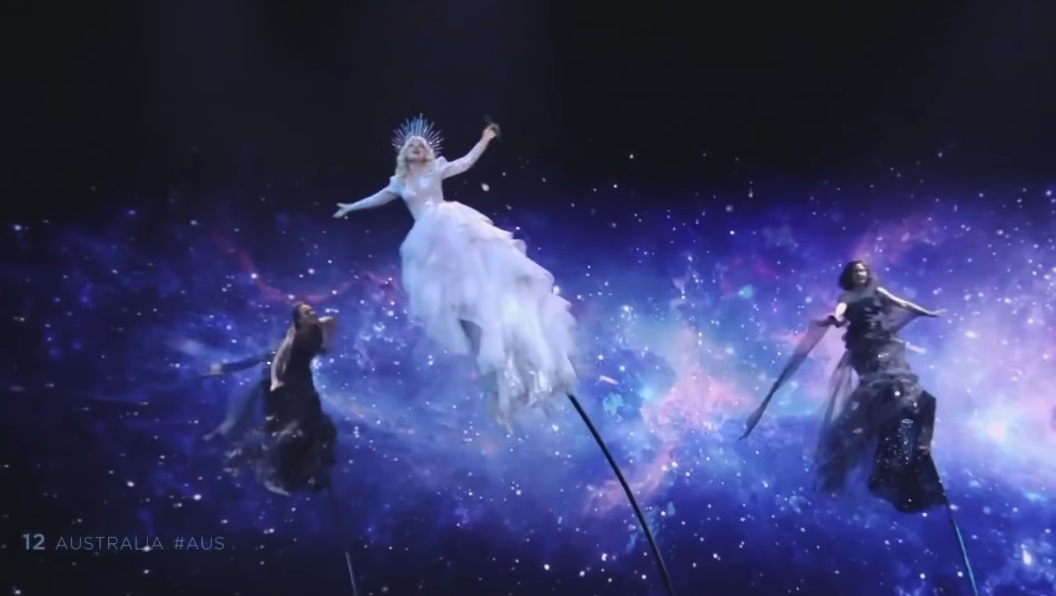Australia’s Eurovision entry Kate Miller-Heidke opens up about her gravity-defying performance
The singer's track 'Zero Gravity' is one of the favourites going into Saturday night's grand final.
By Will Stroude

Words: Christian Guiltenane
After two semin-finals and with just 24 hours to go until the Eurovision Song Contest grand final on Saturday night (18 May), it’s time to start making your call as to who’ll be lifting the trophy in Tel Aviv.
You certainly wouldn’t be unwise to take a punt on Australia’s entry Kate Miller-Heidke, who wowed audiences across Europe in Teusday night’s semi-final with an awe-inspiring – and incredibly bouncy – performance of the Kate Bush/Bjork-esque ‘Zero Gravity’.
A well-established singer in her native Australia who also the music and lyrics for the musical stage version of Muriel’s Weddingi, there was plenty to talk about when we caught up with Kate shortly before she jetted off to Israel…
So Kate, you have a really varied and accomplished career working in all sorts of genres – how did Eurovision come about?
I’ve been a fan of Eurovision for a long time, and particularly in the year since Australia’s involvement. You know, there’s just been a little voice in my head telling me that it’s something that I should think about. I’ve always been attracted to the more experimental side of Eurovision and how artists are given carte blanche to fulfil their craziest and most extravagant and creative fantasies. So that’s what drew me to Eurovision.
Are there any particular artists over the years that have attracted you like that, that you really enjoyed?
Yeah there are many, but it really did crystalize for me last year watching Netta win. Vocally, she was just incredibly faithful and surprising and courageous in a way that really spoke to me. You know the thing, I had such a big grin on my face watching her and that was the moment where I really started to suspect it could be a good competition for me.
‘Zero Gravity’ combines pop with clasicial singing was it always your goal to blend the two?
Yeah so I did write a song specifically for Eurovision. I’ve spent a few years now writing songs for particular briefs. Having just written the music and lyrics for Muriel’s Wedding: The Musical, and writing songs to fit with what a characters going through or to advance the plot at a particular point. So when they put their call-out for submissions for that national finals of Eurovision, different ideas started percolate and I was sort of envisioning myself on that stage and what, as audience member what I would like to hear. You know I have a classical background, so the Eurovision brief gave me licence to go further than I might normally go. Everything about Eurovision is heightened, its bigger and better, so you know, dynamically it’s huge. This song goes from really soft and introspective to absolutely, you know, stratospherically high and joyful and you know, hopefully, by the end of the song empowering.
How did you then find your incredible staging for the competition?
It was done in collaboration with the Director from SBS and the choreographer and the amazing acrobat from Strange Fruit, the woman, the dementor and the bendy pole. It was like any piece of theatre, very much a collaborative effort. I think we learnt lot by doing certain things that worked and some that perhaps didn’t work quite so well. So it’s great to be able to have another crack at it and refine the vision and streamline the staging.
You’ve spoken about how it was inspired by your depression after the birth of your son Ernie. Is there broader message in the lyrics for other people that are going to be watching?
No not beyond an emotional message. I don’t see myself as a political songwriter. I write about feelings, I write about what I feel strongly about and what matters to me, you know, on an emotional level. Having said that though, you know, occasionally a song will spark something with people and mean something, you know, and beyond just the song at face value and the response to ‘Zero Gravity’ particularly from new parents, new mothers has been amazing and in some ways fuels discussion about depression and that’s obviously, you know, quite meaningful for me to get that sort of feedback.
Obviously Eurovision is very popular in the LGBTQ community, and an ongoing topic in the community is mental health for people that are LGBT and how they deal with that. Ddo you think, lyrically, it could be something that they connect with too?
It’s about transcending depression and for me you know, even just singing the song; I find it a really empowering experience. It tries to take you through that journey and out the other side. It’s not for me to say how the song might affect other people, you know. Music is so subjective. Yeah, that’s what’s in my head anyway.
Are there themes that have been recurrent over your career in the music that you write?
I’m not sure, I mean, I would say no, but maybe I don’t have much perspective on that question. Perhaps someone else should analyse the themes and draw out those threads, I mean, yeah, I don’t know. I guess I do have songs about feeling like an outsider, not fitting in, feeling alone and I guess I’ve always used music as a way to connect with people to assuage some of that loneliness so maybe that’s a theme.
At school, were you sort of carving out your path at that time? Did you fit in?
I definitely did not, I mean, I was the unpopular kid at school for sure. I eventually found my, you know, my social niche with the music theatre kids, that was like, it really opened up a new world for me and it kindled the love of musical theatre that I, you know, I still have today. But I was a very odd kid I think.

When you first started on the path of music and writing and performing, was it a naturally and relatively comfortable path or were there hurdles along the way?
I mean, I’m 37 now, so I’ve been a singer/songwriter for you know, professionally, fulltime for 15 years and it’s, nothing ever feels like it comes easily. It feels like it an endless kind of process of navigating your way around brick walls. And I guess that’s you know, part of making music, that is in a way niche music, you know, it’s not necessarily always radio friendly or doesn’t fit in the particular parameters of commercial pop music. But at the same time, you know, my fan base is incredibly loyal and you know, devoted. They come to gigs, they like to hear live vocals and songs that are about real things.
Does singing classicial ersus pop use different techniuqes, like sprinting versus long-distance running?
Yeah, you actually use different muscles in the voice. I sort of over time have developed my own hybrid style of singing which is, you know, not quite pop and not quite classical. The real proper opera singer, I’m sure would look on me as a complete fraud and I certainly couldn’t stand up tomorrow and walk into a Mozart opera or something. I do have that edge to my voice and I did study straight classical technique. But just overtime have adapted it to my own needs and my own style I guess. But with ‘Zero Gravity’ I really did set the bar quite high for myself and it actually ended up being a lot more challenging to sing than I initially planned on and so I have gone back and gotten some proper singing lessons to try to really nail down that whole technique.
Historically at Eurovision it’s been very heavy with novelty acts, but now many of the countries are entering more sophisticated pop. Do you think it’s a shame that there aren’t more novelty acts, like the Polish milk maids, or do you think it should be a forum for up-and-coming artists?
No, I like the milk maids. Yeah, I don’t see Eurovision as, like an audition for people to become normal pop stars. Obviously that can happen and that’s fabulous if it works but I definitely, but having said that I think there are some really cool surprising out-there acts this year. Everything they do is a piece of theatre and I absolutely admire what they do. There’s the Norwegian song – ‘Spirit in the Sky’ which is it’s a really joyful, likeable pop song, but it’s pretty weird, you know.
Then for Britain, we have Michael Rice who I think also performed at Eurovision in Concert in Amsterdam last month. Did you catch his performance?
Yeah, I did and he’s sang the shit out it! Like, he’s an amazing singer.
Your husband Keir is also part of your band and a musicial collaborator – how do you keep the balance between work and pleasure?
With great difficulty. I mean, we talk about ‘work’ in inverted commas all the time and it’s something we’ve had to work on as a couple. You know, we’ve been together for nearly 20 years, sometimes it’s been easier than others especially when we’re spending long periods of time on tour, on the road and we’re basically in the same room24/7 for months at a time. But you know, we just have to draw a line some time and say that’s it we’re not going to talk about career stuff. It helps to have Ernie, our little son, he demands a lot of attention. He’s nearly three actually.
Will Keir be going to Tel Aviv with you or will he be home on babysitting duties?
Yeah Keir will be parenting Ernie while I’m away. He and Ernie have an amazing bond and I‘m scared about leaving Ernie for that length of time. It’s going to be the longest we’ve ever been apart, 2 and a half weeks and it’s going to be rough. But I think ultimately it’s better for him to be in his familiar environment and I’m going to be so busy over there anyway that I just need to give my performance all my focus.
He seems to be quite musical because there’s videos of him online playing the piano or playing his little keyboards and performing for the camera?
Yeah, he’s a complete show off. He likes the spotlight on himself so he’s not a fan of my singing.

You’ve spent the last couple of years working on Muriel’s Wedding: The Musical, which has received amazing reviews and is now touring. Is it going to come to the UK?
I really, really hope so. We’ve got some UK theatre owners and producers coming over to see the show. It’s in Melbourne at the moment so that would be a lifelong dream of mine to see Muriel in the West end.
Obviously ABBC had a revival at the time of Muriel’s wedding coming out in the cinema and ABBA are also hugely linked with Eurovision. What do you think the secret of their success is?
I don’t know, they just tapped in to some writing voodoo. It’s like they developed this short cut, this neurological kind of like pleasure node in peoples brains and they figured out a way to keep pushing those buttons. I mean I don’t know. It’s just pop song writing genius. So economical and brilliant.
The Eurovision Grand Final airs on Saturday 18 May at 8pm on BBC One.
